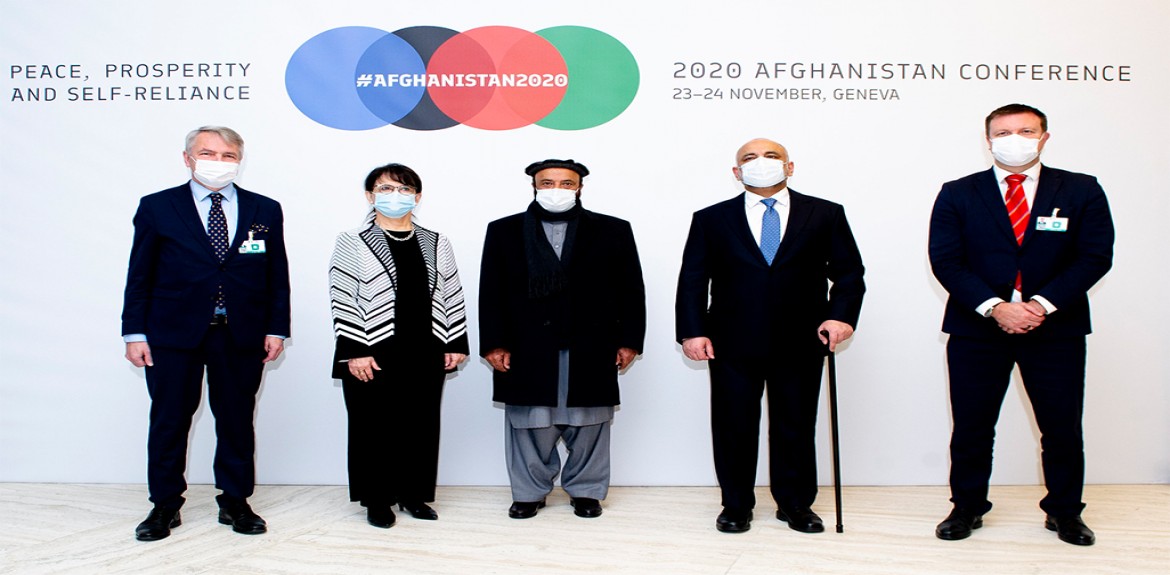Few days from today, on 23rd and 24th November 2020, 66 countries and 32 International Organizations come together in virtual format to discuss shared development objectives, renewed their commitments, and pledged generous financial support to the Government of Afghanistan.
Geneva Afghanistan Conference 2020, named after Peace, Prosperity, and Self Reliance, marks the nearing end of the transformation decade (2015-2024) and time to reflect on where the Afghan Government started and where they are heading in a bigger picture, starting since Bonn conference 2001. With the foundation of the new relief framework and measuring the past commitments, it is time to reassess advancements made and introduce reforms demanded and much needed. Over the years, there have been remarkable achievements, but it's never enough against the expectations.
Few days from today, on 23rd and 24th November 2020, 66 countries and 32 International Organizations come together in virtual format to discuss shared development objectives, renewed their commitments, and pledged generous financial support to the Government of Afghanistan.
U.N special envoy to Afghanistan, Deborah Lyons, stated after the conference that "today Afghanistan got a big virtual global hug." What feared the Afghan side was that 'the lesser pledges would jeopardize the peace and development process that could lead to repeat the history of 1990s.' While the International Community grappling with the epidemic felt the urgency of aid and came with a responsible approach, they offered more the expected. Afghan Government now has 3 billion Dollars in hand for 20201 and 13 billion dollars for five years (according to Finance ministry), slightly less than 15 billion dollars pledged at Brussel conference 2016. What is promised is enough to keep the country running without jeopardizing the development.
As foreign aid shapes more than 50 percent of the Afghan Government's annual budget, the European Union, as one of the main donors in the conference, pledged 1.2 billion euros, called it based on precise conditions and principles. On the other hand, NATO reaffirmed their commitment to continue Train, Advise and Assist Afghan national security and defense forces. Actual pledges could not be confirmed as some countries did not release it officially. Some states like the United States and Turkey pledged 300 and 75 million dollars, respectively, for the shorter term. The United Kingdom pledged 155 Million pounds annually, lesser than its previous 187.5 million pounds. Canada pledged 270 million Canadian dollars over the next three years, While Germany promised 430 million euros for each of the next four years, adding "if circumstances allow."
In its opening speech by President Ashraf Ghani, the Afghan Government termed peace as the main priority of the Afghan People and emphasized preserving the gains of the past two decades. He also reiterated his commitment to maintaining and expanding on the economic, social, political, and development gains. Amrullah Saleh, the first vice president, brought forward the Afghan version of the story and partly responsible countries involved in Afghanistan affairs. He pointed out the Afghan Government's lack of oversight of aid money spent by NGOs. Mr. Saleh projected limitations in fighting corruption, which he termed had shadowed the developments made and drain the valuable resources.
Geneva Conference 2020 was also time to launch the Afghan national Peace and Development Framework-2 (ANPDF-2), which envisions aid effectiveness, peace, prosperity, and self-reliance. With new aid, architecture sketched expected more severe conditions and strict requirements based on financial assistance; this is an ambitious development and reform plan. International partners and the Government of Afghanistan have reached a consensus on the fight against corruption in light of the Geneva Mutual Accountability Framework (GMAF). Afghan Government ahead of donors conference 2020 renewed its commitment to curb corruption by establishing an independent commission against corruption.
The International Community unanimously called for an immediate, unconditional humanitarian ceasefire in the Geneva conference, at a time when the Government's negotiation team enter the peace dialogue with well-defined red lines. According to the Government interpretation, red lines revolve around the achievements they have made in establishing Democratic institutions, protecting Human Rights, Women's Rights, Freedom of Speech, and other fundamental freedoms. A few weeks before, the Geneva Conference wall chalking was noticed in some parts of the Kabul city stating "Ma Bar Namey Gardem," which means we will not return (to our near past).
After decades of war, Afghans see the light at the end of the tunnel and hopeful towards the results of negotiations between teams engaged in Doha, Qatar. Although a sharp rise in violence has dented their trust in the process, there is a hope that once a humanitarian ceasefire is reached, the speed of reforms and progress would multiply. On its part, the Afghan Government took hard decisions like freeing 5000 Taliban prisoners as a part of confidence-building measures.
The positionality of Afghanistan amidst the peace negotiations is increased violence and a rise in the number of people living under the poverty line due to pandemic. Afghans recognize that it was never easy. They know it is a long, challenging, and bumpy road ahead, but what makes this journey possible is an assurance of continued financial support and steadfast cooperation. Afghans all these years have been fighting a hidden war incside their communities against terrorism, illiteracy, human rights abuses, and corruption while strengthening democratic values and institutions. Afghans at the receiving end acknowledge that Donors' continued generous support and reestablishment of cooperation give a moment of relief to Afghans.
The Geneva conference's communique mentions the Senior Officials Meeting (SOM) of donors in 2021 and the ministerial conference in 2022 to review the progress made and address the challenges. The communique also focuses on the issues of traditional justices, human rights, strengthening democracy, and calling for an end to the war.

